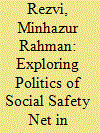|
|
|
Sort Order |
|
|
|
Items / Page
|
|
|
|
|
|
|
| Srl | Item |
| 1 |
ID:
182457


|
|
|
|
|
| Summary/Abstract |
The purpose of the study is to explore the politics of beneficiaries’ selection and resource distribution of social safety net (SSN) programs and how local elites and political groups establish political settlement by using it as a tool. In developing countries, formal systems are not strong enough and elites’ groups use their power to create informal institutions for securing their interests. As other studies have shown, informal politics influence the processes of selection and distribution of SSN programs in Bangladesh. The study is qualitative in nature and the selected research area is Rajakhali Union in Cox’s Bazar District. The study found that informal systems (e.g. clientelist politics, political affiliation, personal conflicts, and kinship) determine the selection and distribution of SSN programs. The Union Parishad (UP) members distribute the SSN programs to their ineligible clients (supporters, local elites, and political groups) by bypassing the formal systems for strengthening clientelist relations, increasing their legitimacy, stabling their power, and increasing their vote banks. They (UP members, political elites, and local elites) have allowed introducing more informal structures that better serve their interests. They have used the SSN programs as a tool for establishing the political settlement (distribution of power between UP members and local elites).
|
|
|
|
|
|
|
|
|
|
|
|
|
|
|
|
| 2 |
ID:
103307


|
|
|
|
|
| Publication |
2011.
|
| Summary/Abstract |
In democratic elections, candidates and parties promise to deliver public goods to segments of the electorate to win their support at the polls. In new democracies, especially in rural agrarian societies, existing networks of clientelist politics can alter this logic, so that candidates instead promise private goods to patrons in return for those rural patrons delivering the votes of their clients. This suggests that in such regimes, the distribution of public goods spending by the government should vary inversely with the strength of clientelist networks. Specifically, we propose that the strength of patron-client ties varies according to whether peasants farm as smallholders, sharecroppers, fixed rent tenants, or landless laborers. Accordingly, the strength of rural patrons should vary across districts with the distribution of households among various land tenure categories. Our theory then suggests that where land tenure patterns render rural patrons weaker, elected governments should invest more resources in public goods to win the votes of peasants. Where land tenure patterns give patrons more control over peasant farmers, government spending on public goods should be lower because candidates and parties have to devote more resources to private benefits to the patrons. We test this proposition with district-level data from Nepal on the patterns of land tenure and on the provision of public goods.
|
|
|
|
|
|
|
|
|
|
|
|
|
|
|
|
|
|
|
|
|